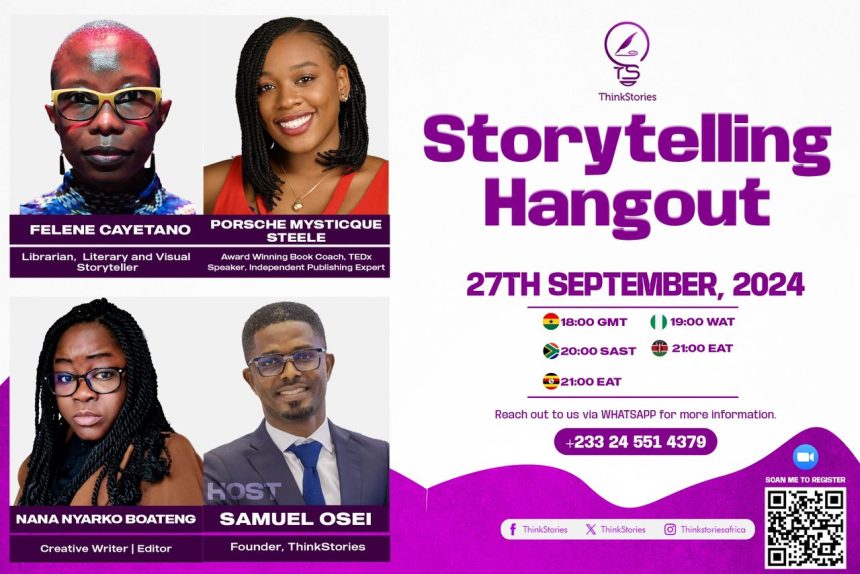ThinkStories Africa, a knowledge-sharing, networking, and skills-improvement platform for communicators, hosted its quaterly virtual event dubbed ‘The Storytelling Hangout’ as an opportunity to discuss the role of emotions, cultural narratives and AI in storytelling among communication experts.
Featured speakers included Porsche Mysticque Steele, an award-winning book coach, an independent publishing expert and TEDx speaker; Felene Cayetano, a librarian, literary and visual storyteller; and Nana Nyarko Boateng, a creative writer and editor.
Speaking at the event, creative writer, Nana Nyarko offered profound insights into the art of storytelling, emphasizing the emotional depth that drives creative expression. She spoke about the significance of evoking emotions to craft stories that resonate beyond personal experiences, to leave a lasting impact.
“People will forget what you say, but they will never forget how you make them feel. I think that storytelling, and most of our creative output, is driven by passion. And if you don’t feel anything—and it doesn’t necessarily have to be a positive emotion, it could be anger—I feel like you need to feel something in order to create art that is meaningful, that lives beyond your own experience. It’s so easy to return to a feeling, which is why it’s important to try to tap into some emotional thread when you’re telling a story.”
She also reflected on how one’s background influences their creative work, stressing the importance of self-awareness in storytelling. This, she said, helps create a critical distance from one’s own work and enables an understanding of how others may perceive life differently.
“It’s our backgrounds—how we think, what we believe, how we experience the world—that really is influenced by our background. If you want to tell a story that affects people emotionally or makes them think, then we bring all of ourselves to that. I think that self-awareness of how your experiences shape your creative output is important because it’s only then that we can have some critical distance from our own work and observe how others may perceive or experience life differently from us.”
The award-winning book coach, Porsche Steele focused on the transformative power of storytelling. She explained that while stories create fiction and information fills textbooks, combining wisdom with storytelling has the power to change lives. She urged writers to reflect on their experiences and extract the wisdom within.
“In order to generate impact from the people you help to serve, you have to combine story around your wisdom. If people want to publish a book that transforms lives, you need to combine story and wisdom. Our lives aren’t just one long story, they’re made up of many different ones. Pick out a story, discover the wisdom you gained from it, and then share it to generate impact for your readers.”
In sharing her journey into visual storytelling, from photography to film, Felene Cayetano highlighted how film can capture the essence of her people’s experiences in ways that written work cannot.
“I wished, I really, really wished I had pictures of my friends and family and the whole landscape—those things I could only keep in my memory. Life is uncertain, you never know when you’ll be uprooted again. I used words to hold on to it, and eventually, I used the camera too, when I was able to purchase one.”
She also spoke about how foreign films often use Belize as a backdrop, but rarely tell the stories of its people, which motivated her to capture and feature her culture, language, and way of life through film.
“Hollywood films—and maybe not just Hollywood—come to Belize and use it as a backdrop. We’re not the central characters, our stories aren’t the ones being projected. I feel like I have a story that would translate well on screen, showcasing our traditional knowledge, our way of life, things that can’t be described on paper. As Nana said, storytelling is a feeling. The same applies to my visual work, especially in capturing landscapes and nature.”
Felene further shared how her journey in storytelling is about amplifying the voices of her people, particularly women, to ensure their stories are preserved for future generations.
“When it comes to film, I’m focused on telling stories that aren’t told—stories of women, especially. I lived with my maternal grandfather and recorded many of his stories, but I didn’t capture my paternal grandmother’s stories, and that’s forever lost to me. I feel like, in telling more women’s stories, I’m honouring her memory, making sure that our stories are told.”
ThinkStories is a knowledge-sharing, networking, and skills-improvement platform for African communicators.
Founded by Samuel Osei, a Storyteller, and Communications professional based in Ghana, West Africa, ThinkStories seeks to foreground the continent’s multiplex narrative by promoting the art of storytelling and broadening the conversation on how to build and influence global brands.
–
Story by: Cindy Selasi Humade | univers.ug.edu.gh





